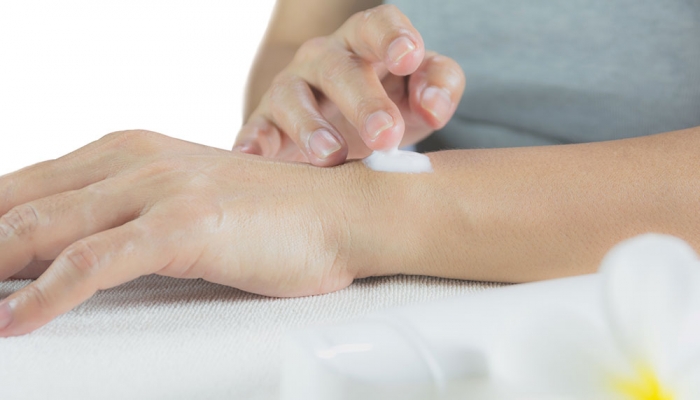What Causes Carpal Tunnel Syndrome and How Is It Treated?

If you have numbness, tingling, or pain in your hand or arm, you may have carpal tunnel syndrome. It’s important to see a doctor if you have these symptoms because if the problem isn’t treated, it will get worse, and you can develop nerve damage.
People develop carpal tunnel symptoms when the median nerve is compressed. This is a nerve that gives feeling to all our fingers except the pinky. It also controls some muscles around the base of the thumb.
To understand what’s happening when people develop carpal tunnel syndrome, we need to think about the anatomy of the wrist. There is a “tunnel” about 1-inch wide through which the median nerve travels to reach the hand. Bones make up the bottom and sides of that tunnel, and the transverse carpal ligament bounds the tunnel on the top.
When there’s not enough space in that tunnel, the median nerve gets pinched. This can happen because of swelling in tissues in the wrist. When the nerve is compressed, the symptoms start, mainly pain, tingling, and weakness.
Several factors increase the risk of developing carpal tunnel:
- Sex. Women are more likely to have carpal tunnel syndrome than men.
- Age. Being older raises the risk.
- Heredity. Just as some people inherit blue eyes and short stature, some naturally have smaller carpal tunnels.
- Repetitive hand motions that you may perform as part of a job or hobby, or extreme flexion or extension of the hand and wrist.
- Pregnancy.
- Diabetes.
- Rheumatoid arthritis.
- Thyroid gland problems.
If you develop carpal tunnel syndrome symptoms, your doctor will probably first try treating it with a brace or splint, nonsteroidal anti-inflammatory medicine (such as ibuprofen), a change in activities, and steroid shots.
If these don’t provide enough relief, you probably need a type of surgery called a carpal tunnel release. In this operation, the transverse carpal ligament that bounds the top of the carpal tunnel is cut in two. This makes more room for the medial nerve and relieves the pressure on it. Over time, the ligament may grow back together, but the extra space for the nerve will remain.
The surgery is an outpatient procedure, which means you will go home the same day. You can expect some pain and swelling after the surgery. Your doctor will recommend pain medicine and exercises to keep your fingers from getting stiff.
You’ll be able to use your hand, but carefully, in the first few weeks for activities like driving, writing and self-care.
It may take a few months—or up to a year if your carpal tunnel syndrome was advanced—before your full strength returns after surgery. Depending on how your recovery is going, you may need to see an occupational therapist for hand and wrist exercises.
If you’re wondering if you’d benefit from carpal tunnel surgery, feel free to contact one of our orthopedic specialists for an evaluation.
Specialty Surgical Center is located in Sparta, New Jersey, and our staff consists of board certified surgeons and anesthesiologists performing procedures in orthopedics, sports medicine, spinal care, podiatry, urology, pain management, ENT, hand surgery, lithotripsy, brachytherapy, GYN, and laser surgery.
For more information about Specialty Surgical Center, call 973-940-3166 or visit our Contact Page.
The information contained in this article is for educational purposes only and is not intended to replace or counter a physician’s advice or judgment. Please always consult your physician before taking any advice learned here or in any other educational medical material.
Do Over-the-Counter or Home Remedies for Surgical Scars Work?

Surgery can correct health problems and sometimes even save your life. Unfortunately, it also sometimes leaves you with a scar or two.
Surgical techniques have improved tremendously in the last few decades so that more and more procedures can be done with small incisions that don’t leave big scars. Whenever possible, surgeons try to make those incisions in the least noticeable places.
Still, any injury to the skin, whether it’s accidental or carefully done with a scalpel, can leave a scar. If the scar is visible, you may be wondering if there’s an easy way to make it go away. Do over-the-counter (OTC) or home remedies work?
The short answer is some of them may help, although nothing can make the scar invisible. Here’s a look at what’s out there:
Common OTC and home remedies
- Silicone scar sheets or gels. These products have the most evidence to back them up. Studies have shown they can improve the appearance of some scars, although it may take a few months of regular use to see a difference. Silicone treatment seems to be especially good at improving the appearance of thick scars.
- Onion extract. Some studies have shown products containing onion extract helped improve the appearance of scars, although another study failed to find evidence that they helped. If you want to do a study on yourself, you can try a product called Mederma, which contains onion extract and allantoin. It may take several weeks to see a difference.
- Vitamin E, cocoa butter, aloe vera, or similar lotions: If you use products containing these substances right after your surgery, they may help keep your skin in good shape so you have less of a scar. But there’s no evidence that they make an existing scar less visible.
- Chemical exfoliants. These are often found in anti-aging creams and serums intended to remove outer layers of skin to smooth fine lines. They can help diminish dark marks and acne scarring, although it’s not clear whether they would make a difference with surgical scars.
- Sunscreen. While sunscreen won’t remove scars, it can help keep them from getting darker, so it’s a good idea to always apply it to any exposed scars before going outside.
Prescriptions and surgical treatment
If you’re not satisfied with OTC treatments and home remedies, talk to your medical team. They may prescribe tretinoin or steroids or recommend collagen injections.
Cosmetic surgery is also an option for some scars, although your insurance probably won’t cover it unless your scar is causing a non-cosmetic problem, such as interfering with movement.
Preventing scars
Your best bet is to minimize scarring to begin with by doing what you can to help your incision heal well. Your doctor will give you specific wound care instructions when you leave surgery, but in general, here are some recommendations for reducing scar formation:
- Keep the wound and bandages clean to help promote fast healing.
- Use petroleum jelly or a similar ointment on the wound to keep the skin from drying out.
- Remove stitches at the right time. Taking them out too early or leaving them in too long can increase the chances of scarring.
- After the wound has healed, use sun protection. Covering up or using sunscreen can prevent a scar from darkening and becoming more obvious.
At Specialty Surgical Center, we are sensitive to your desire to avoid scarring and use techniques designed to minimize the problem. Please don’t hesitate to talk to your surgeon about any concerns you have.
Specialty Surgical Center is located in Sparta, New Jersey, and our staff consists of board certified surgeons and anesthesiologists performing procedures in orthopedics, sports medicine, spinal care, podiatry, urology, pain management, ENT, hand surgery, lithotripsy, brachytherapy, GYN, and laser surgery.
For more information about Specialty Surgical Center, call 973-940-3166 or visit our Contact Page.
The information contained in this article is for educational purposes only and is not intended to replace or counter a physician’s advice or judgment. Please always consult your physician before taking any advice learned here or in any other educational medical material.
My loved one is having outpatient surgery. What do I need to know?

While outpatient surgery is generally less serious than surgery that requires a hospital stay, it’s still no walk in the park. If a close friend or family member is having outpatient surgery, they are going to need some support, both emotional and physical.
Outpatient surgery means they will go home the same day that the surgery is performed. It doesn’t mean they will be back to full strength right away though.
The recovery process—and the support they will need—depends on the type of surgery they’re having, but in general, here are some ways you can help.
Go to the surgery center with them.
Having a companion along as they fill out paperwork and wait to be taken into surgery can help keep their spirits up. You can also help them remember recovery instructions that they may be too stressed or groggy after surgery to recall.
Offer to drive them home and stay with them.
If your friend or loved one has had sedation or general anesthesia, they will not be allowed to drive home. They will also need someone to stay with them at all times during the first 24 hours after their release from the surgery center.
Encourage them to take it easy.
Even after the first 24 hours, they will need help. Their recovery will go smoother and more quickly if they’re able to get plenty of rest in the first few days after surgery.
Help out to help them avoid reinjury.
Lots of everyday activities that your loved one takes for granted could cause problems after surgery. Cooking, cleaning, taking care of pets, grocery shopping, and more may be off-limits for a time depending on the surgery.
Your loved one may want to avoid bothering people to help with these chores. Assure them that you want to help and that their injury-free recovery is important. Remind them that they’ve helped people in time of need and will do so again when they’re well, so they need to let others have a chance to be helpers.
Keep them entertained.
If the recovery process is long, your loved one may become bored and frustrated, especially if they’re used to being active. Bring them good books to read, watch movies with them, or just hang out and talk. Encourage their friends to come visit when they’re ready to see people.
Help keep their spirits up.
If a loved one is going through a lengthy and painful recovery, they may get discouraged. Remind them of the reasons for the surgery and that their hard work during recovery will pay off. Brighten their day with a card or flowers.
And remember, if your loved one has any complications or questions after surgery, don’t hesitate to call their doctor. The staff is used to fielding questions and wants the recovery to go as smoothly as possible.
Specialty Surgical Center is located in Sparta, New Jersey, and our staff consists of board certified surgeons and anesthesiologists performing procedures in orthopedics, sports medicine, spinal care, podiatry, urology, pain management, ENT, hand surgery, lithotripsy, brachytherapy, GYN, and laser surgery.
For more information about Specialty Surgical Center, call 973-940-3166 or visit our Contact Page.
The information contained in this article is for educational purposes only and is not intended to replace or counter a physician’s advice or judgment. Please always consult your physician before taking any advice learned here or in any other educational medical material.
Specialty Surgical Center is First Surgical Center to Receive World Class Patient Safety Training
At Specialty Surgical Center in Sparta, New Jersey, patient safety is one of the top priorities of the medical staff. With safety as an ever-evolving goal, the staff regularly participates in training to ensure that the safety culture at Specialty Surgical Center is the very best it can be for their patients. For more information and to read the official press release, click here.
Specialty Surgical Center in Sparta, New Jersey is committed to the very best experience possible. Combining quality healthcare with transparency of price, Specialty Surgical Center aims to educate patients of their power of choice in healthcare. Visit http://www.SpecialtySurgeryCenter.org or call or call 973-940-3166 for more information.


